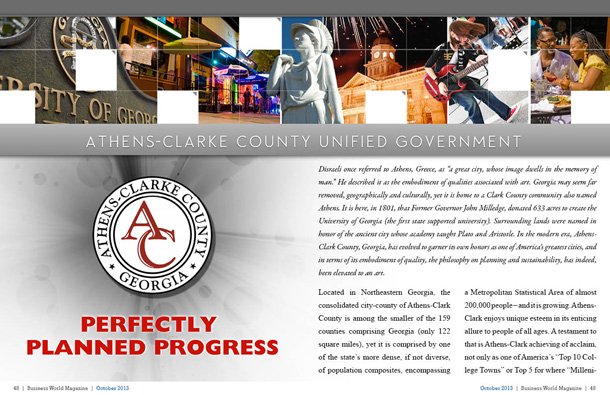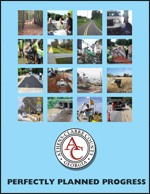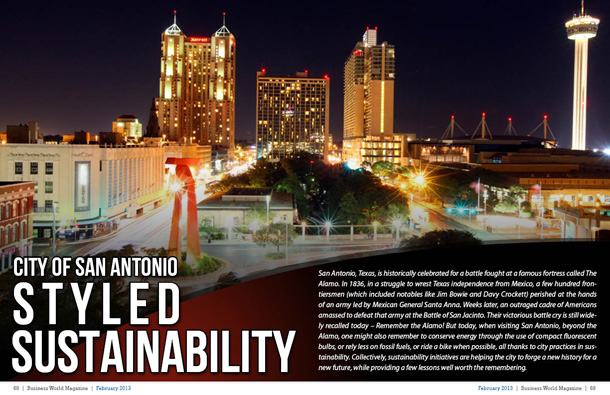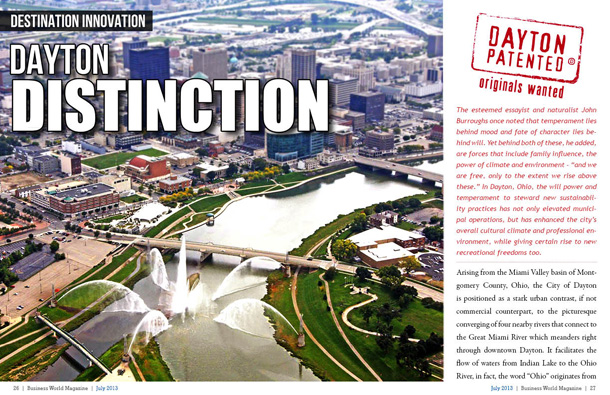
Perfectly Planned Progress

Disraeli once referred to Athens, Greece, as “a great city, whose image dwells in the memory of man.†He described it as the embodiment of qualities associated with art. Georgia may seem far removed, geographically and culturally, yet it is home to a Clark County community also named Athens. It is here, in 1801, that Former Governor John Milledge, donated 633 acres to create the University of Georgia (the first state supported university). Surrounding lands were named in honor of the ancient city whose academy taught Plato and Aristotle. In the modern era, Athens-Clark County, Georgia, has evolved to garner its own honors as one of America’s greatest cities, and in terms of its embodiment of quality, the philosophy on planning and sustainability, has indeed, been elevated to an art.
Located in Northeastern Georgia, the consolidated city-county of Athens-Clark County is among the smaller of the 159 counties comprising Georgia (only 122 square miles), yet it is comprised by one of the state’s more dense, if not diverse, of population composites, encompassing a Metropolitan Statistical Area of almost 200,000 people – and it is growing. Athens-Clark enjoys unique esteem in its enticing allure to people of all ages. A testament to that is Athens-Clark achieving of acclaim, not only as one of America’s “Top 10 College Towns†or Top 5 for where “Millenials†should move (that’s people aged 18 to 29), but it is also recognized among the Top 25 of Best Places to Retire by both Forbes and CNN Money. The Milliken Institute has also named Athens-Clark as one of America’s best cities for successful aging, and to be sure, the community offers plenty of pursuits to help pass the time. In addition to being named as one of the prettiest cities in America, or best in “Bicycle Friendly†communities by the American League of Bicyclists, Zagat has tastefully touted Athens-Clark among the most fab for foodies. With respect to its fame in other servings, Athens-Clark has been nationally credited for having the hottest music scene outside of Nashville and Los Angeles, in fact, this same scene gave rise to award-winning, internationally-acclaimed bands that include The B-52s and REM, not to mention other shiny, happy, people. Combine all this with education opportunities at The University of Georgia, increasing employment and an economy that continued to grow even while other communities wrestled with the grips of recession, Athens-Clark County has certainly blossomed as one of the sweetest spaces in the Peach State – just as it was planned to be.
Â
Working the Plan
While communities throughout the world have recently moved forward in strategizing or implementing sustainability practices, Athens-Clark has been remarkably ahead-of-the-curve. This is not only evidenced in the range of municipal infrastructure that has been LEED Certified (as local ordinances demand), yet sustainability is also reflected in the preservation and protection of green spaces, advancements in water quality and water conservation, recycling programs to reduce impact to area landfills, enhancements in transportation and fleet operations, and much more, yet these are anything, but new programs. As Mayor Nancy Denson affirms, “For more than 15 years now, there’s been a mindset of sustainability in this community … we have a lot of smart people and a county commission that has been very supportive… it has allowed us to make choices that are good for our community.â€
Athens-Clark Senior Planner Bruce Lonnee explains that the community of today, as well as that of tomorrow, is ultimately a byproduct of what has been careful, conscientious, socially and environmentally-sensitive planning; planning that began some two decades ago.
Lonnee explains that the community spent almost two years devising a land-use plan that evolved after conducting 200 separate public meetings. “No one could ever say they didn’t have a chance to provide input,†says Lonnee, who adds, “The neat thing about being a planner is that it places you right at the intersection of Main Street and everyone else’ interest.†To his point, for a community that plays hosts to a large demographic of university students, retirees, small business and large enterprise alike, the potential for conflict from varying agendas is almost assured. Yet, Lonnee says love for the community has proven to take precedence over any form of self-interest. That said, when the land use plan was enacted in 1999, it provided guidelines that ultimately influenced more than just the way land would be used or not used, but the manner in which development would occur, the way resources would be maintained and social services developed. “The plan became a backbone for this body of work that would follow … and we simply had to connect the dots between three rings. In the center ring was a highly urban core with low density that discouraged sprawl. An outer ring consisted of green space, which would remain virgin and protected land. And the space between represented a suburban ring, where schools and neighborhoods are located, and in this area, we knew whatever we would do, we could do it better by working with the schools and local residents.
Â
Water Wise
Lonnee’s assertion about “doing it better†has resulted in measures that even exceed state standards when it comes to protection of water resources. In establishing environmental area ordinances, Athens-Clark created buffer zones that exceed state requirements of 25 feet, or in this case, enacting 100 foot buffers on large water bodies and 150 feet buffers on waters in industrial areas. “We knew water was going to be a big ticket item … we have no acquifers nor desal plants, most of our water comes from surface water, so buffering would help keep development from impacting these resources. And we protected our floodplain and wetlands by making sure no development would occur in these spaces. That proved to be very prudent in the years that followed when we experienced eight years of drought,†says Lonnee.
A little more than ten years ago, the region created the Bear Creek Reservoir which helps supply water to four separate jurisdictions, yet Athens-Clark has significantly diminished its reliance on that resource through advancements in water conservation. Water Conservation Coordinator Marilyn Hall says advancements in water conservation have led to a more than 20 percent reduction in water use throughout the county. Public campaigns, workshops, and practices such as the capture of rainwater and air conditioning condensation for reuse in irrigation have helped in that process, yet Athens-Clark has scored major benefits from water reclamation infrastructure.
Athens-Clark’s water reclamation system includes three facilities that can collectively capture and treat 28 million gallons of wastewater per day before safely returning it to the environment. When wastewater first arrives at a facility, it first goes through a stage allowing screens to capture any large materials, such as paper or plastic trash, before the water is pumped through a grit system to remove small particles. The water is subjected to filtration and aeration, a process involving mixture with oxygen which allows microscopic organisms to grow which through their own biological processes, help remove some of the pollutants.
The same system allows biosolids to settle to the bottom of tanks, which is captured and then trucked to a compost facility at the Athens-Clark Municipal Solid Waste Landfill, where it gets mixed with shredded yard waste to produce compost – who says waste has to go to waste. Once the waste water has been cleaned, it undergoes further disinfection through ultra-violet light immersion, a technique that has been proven to be both highly-effective, but free of harmful chemicals. The process leaves nothing behind in the water that could be harmful to humans or aquatic organisms before it is safely returned to local rivers. Hall says this process has not only allowed Athens-Clark to advance in its environmental stewardship, but has advanced the operating life of the water treatment infrastructure from 20 years to 50 years. The Athens-Clark Public Utilities Department as well as the reclamation plants and its employees have earned top honors by the Georgia Association of Water Professionals; awards demonstrating these operations reflect best practices in the industry.
Â
Healthy Habitatation
The Athens-Clark County Unified Government Greenspace Acquisition Program has been instrumental in the protection of habitats enjoyed by both wildlife and nature lovers. Vast acres of land have been preserved through this program which includes a recent acquisition of more than 300 acres of ecologically diverse forestland that borders the Middle Oconee River. The acquisition followed more than two years of negotiations with the landowner and collaboration with local organizations that include the Oconee River Land Trust and the Athens Land Trust.
The Athens Land Trust is a private, not-for-profit corporation who has not only been vital to land preservation, but the creation of community gardens and farmers markets. It has also advanced in neighborhood revitalization initiatives and programs that promote both affordable and energy efficient housing. Those efforts have prompted considerable community engagement with schools now developing educational curriculum around the work that takes place in managing local gardens, in many cases, that work is performed local students. Athens Land Trust Operations Director Heather Benham says some students have actually secured jobs in helping manage area gardens, and in other cases, the experience and references gained from that work has led to even greater employment. And in an era which has given way to a national epidemic in child obesity rates, Benham indicates another benefit that has resulted from the creation of community gardens – “Studies show that when kids help grow vegetables, they are more likely to include vegetables in their diet.â€
Affordable housing and community revitalization projects have also taken root through the work of the Athens Land Trust, and not without some challenges that had to be overcome. Benham says in the green areas, outside of the main urban corridor, land is cheaper and some felt these areas should be designated for affordable housing. “We thought, no, it makes more sense to have residents be closer to services and businesses in town, so they could better build upon these opportunities,†says Benham.
That approach has resulted in a range of activities, among the most notable is the major redevelopment of 40-acre site that once held 125 units constructed during President Johsnon’s Administration. Located along a busy urban corridor off Hawthorne Avenue, the Athens Housing Authority has referred to the project as more of a “transformation†as opposed to a renovation. When complete, the site will accommodate as many as 350 units, with two-thirds designated as affordable housing (sold at prices adjusted for tenant income) and one-third will sell at market rate.
Urban spaces have also benefitted from sustainability practices that are as socially sensitive as they are environmentally prudent. David Clark, Director of Transportation and Public works, points the community’s use of innovative storm water management practices. Landscaping has been strategically deployed to mitigate impact from runoff, and in other areas, water pervious pavement is applied in parking areas. The water seeps through the pavement into the ground. Residents also have access to one of the largest mass transit systems in the state (a combination of that provided by the county with that provided by University of Georgia). Clarks says reliance on mass transit, along with the creation of bike lanes and a network of sidewalks for pedestrians, helps curb fuel emissions that would otherwise impact air quality. Clark also says Athens-Clark has increased the use of hybrid vechicles within municipal fleet operations. In fact, he says not long after the local police department acquired Toyota Prius vehicles to help tend to administrative functions, the department went on to acquire additional Prius which now help with traffic enforcement. “Anyone who thinks that a Prius doesn’t have the power to pull someone over for a traffic stop – think again,†says Clark.
 Clark says the community is currently developing infrastructure of electric recharging stations to better support use of electric vehicles. “Our tax assessor is now using a hybrid vehicle and we’re also using hybrids in some of our waste management operations. We’re making progress each year and seeing more and more traditional roles being fulfilled by non-traditional vehicles,†says Clark.
Ultimately, when combining everything that is happening in social and environmental stewardship, Heather Benham eloquently asserts a point that all in Athens-Clark have come to realize – “Through our protection of resources and planning as to how we develop, it ends-up helping us attract people and business to our community, who want to have a good quality of life.â€
More to Come
In terms of those who want to come to Athens-Clark, Caterpillar recently announced the community will be the site of a new manufacturing plant. Senior Planner Lonnee says the plant will encompass more than one million square feet and create more than a thousand new jobs. Caterpillar selected a 252-acre site which actually straddles the line separating the jurisdiction of Athens-Clark with the neighboring county of Oconee. Leaders from both jurisdictions actually came together to create a customized shared-zoning plan to accommodate Caterpillar, a first of its kind arrangement in the State of Georgia. Caterpillar’s arrival has since led to additional corporate interest in Athens-Clark. Lonnee says there are other master-planned developments, pre-approved and shovel ready, which have since prompted inquiries from other businesses wanting to locate here. “Caterpillar, hopefully, will be a catalyst for other companies. We think it will spark some growth along the edges and bring more jobs, which we’d all like to see develop,†says Lonnee.
While the University of Georgia is, by far, the largest employer in the community (as well as the Athens-Clark greatest supporter and partner in sustainability practices), the community is also made home by a variety of large and small businesses. These too have prospered over time, including enterprises such as Ethicon, Inc., one of the nation’s largest manufacturers of raw materials vital to the production of surgical sutures. It recently announced plans to expand its plant operations in Athen-Clark by more than 100,000 square feet, a $185 million investment that will additionally accommodate dozens of new jobs. Lonnee notes that the company produces more than 75% of the sutures used throughout the world. “For anyone that has gotten a suture after a surgery, there’s a good chance that it came from Athens,†he says.
“Whenever major business decides to locate here or an existing business announces its plans to expand, it helps communicate to other industries all that community has to offer,†says Lonnee, adding that in order to capitalize further on such opportunities, Athens-Clark recently established a new office focusing on economic development.
“We’ve set the table for development so the rules are clearly understood, and the plans review process is fast and efficient, whether that involves a multi-million dollar facility or opening of a small beauty salon, we can get the permits ready in as little as nine days,†says Lonnee.
Newcomers will find another advantage in a special purposes sales tax program, a system that allows citizens to vote on the capital improvement programs they want to see fulfilled. Lonnee indicates this tax program and voter feedback has been integral to Athens-Clark advancing in sustainability.
“The citizens have been very supportive and very active,†says Lonnee. “From our restaurants and arts center, to our nature trails and neighborhoods, Athenians have a deep affection for this place. Little kids love it here, retirees love it here and college kids fantasize about coming here.â€
Lonnee refers to the current population totals as “a sweet spot,†enough to put the community on the radar, with room for growth and still be operationally manageable with existing resources. Lonnee says Athens-Clark is a very special community, and rest assured, this senior planner echoes sentiments shared by all when he says the plan is to keep it that way.
For more information, please visit their website at: Â Â Athens-Clark County
Preferred Vendors of Choice:







